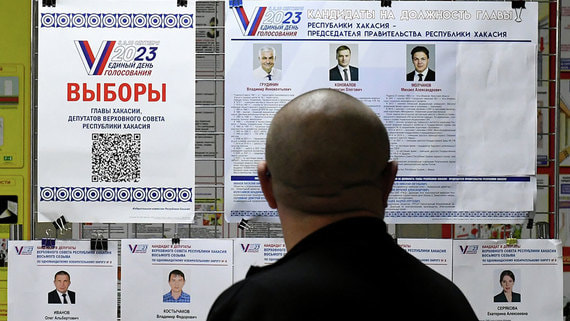Polilog experts analyzed the results of past gubernatorial campaigns
[ad_1]

Experts from the Polylog company in their report “Governors and Election Day. Trends, results, features of campaigns in 2023.” (Vedomosti reviewed it) analyzed the course of the 2023 elections. They came to the conclusion that the competitiveness of the campaigns has decreased compared to 2018. The report associates this with the consolidation around power during the military operation. This, in turn, led to a decrease in support for the opposition.
The year 2023 is interesting not only because of the large number of regions holding elections, but also because it is the first major campaign during the military operation. During the election, election participants were faced with the need to combine the federal agenda related to the special operation and geopolitical pressure with the requirement to generate positive news feeds, the report notes.
To assess the level of competitiveness of elections, Polylogue developed a methodology that took into account several variables: turnout, the number of candidates on the ballot, the number of candidates who received 5–10% and more than 10% of the votes, the percentage of votes of the candidate No. 2 closest to the leader. As a result Polilog experts indicate that the average competitiveness of gubernatorial elections has decreased this year.
In 2018, the average score of all gubernatorial campaigns calculated using the Polylog method was 10, in 2023 it was seven. The number of candidates participating in the elections of regional heads decreased from 95 in 2018 to 89 in 2023. The number of candidates who scored 5% or more decreased: in 2018 there were 47 (of which 24 with a result above 10%), in 2023 – 38 (with a result above 10% – only eight). The average 2nd place result in 2023 has dropped to 9% of the vote, in 2018 it was at 15.6%.
Experts did not notice regions where elections would be highly competitive. At the same time, regarding the elections in Khakassia in 2023, as in Primorye in 2018, the report contains a caveat: the ballot paper changed during the campaign.
“Khakassia would most likely have become the region with the most competitive campaign in 2023, if not for the removal of Sergei Sokol from United Russia from the elections. The report took into account the final version of the ballot that voters in the republic actually received at the polling stations,” says one of the authors of the report, Nikita Setov, Deputy General Director of Polylog for political projects.
All heads and acting heads of regions were elected, Polylog states, the average level of their support is 78.2%. The highest result belongs to Vasily Anokhin (Smolensk region, United Russia) – 86.62%, and the lowest percentage of votes belongs to Valentin Konovalov (Khakassia, Communist Party of the Russian Federation) – 63.14%. Support for regional heads increased by 11.38 percentage points on average compared to 2018.
Compared to 2018, candidates from A Just Russia (-8.08 percentage points) and the Communist Party of the Russian Federation (-5.7%) lost. The results of United Russia (+13.7%) improved significantly and the results of the LDPR (+0.12%) improved slightly.
The average candidate from United Russia scored 78.8% (+13.7 percentage points compared to 2018), the Communist Party of the Russian Federation – 14.6% (-5.7 percentage points), A Just Russia – 4 .1% (-8.08 p.p.), and the Liberal Democratic Party – 7.1% (+0.12 p.p.).
The New People have an average level of candidate support of 4.1%.
The main result of the last voting day was a demonstration of the controllability of the political system and its ability to work in a variety of conditions, dampening potentially destabilizing factors, Setov believes. The elections of regional heads, in fact, had a referendum nature, so it was important for the current heads to improve past results, and for all other candidates to get results in high but reasonable corridors, says Roman Molozhon, head of the special projects department at Polylog.
The current elections were a compromise, says Mikhail Vinogradov, president of the St. Petersburg Politics Foundation: on the one hand, they remained, on the other, their significance was reduced by emphasizing the lack of alternatives.
[ad_2]
Source link








